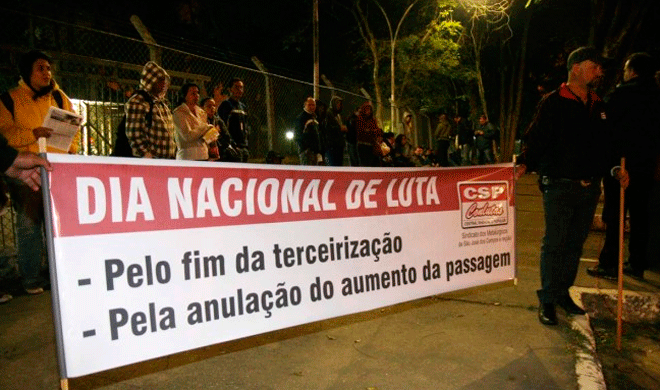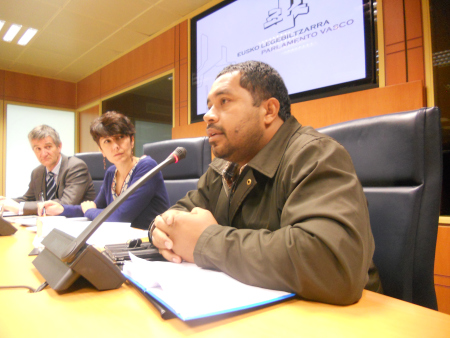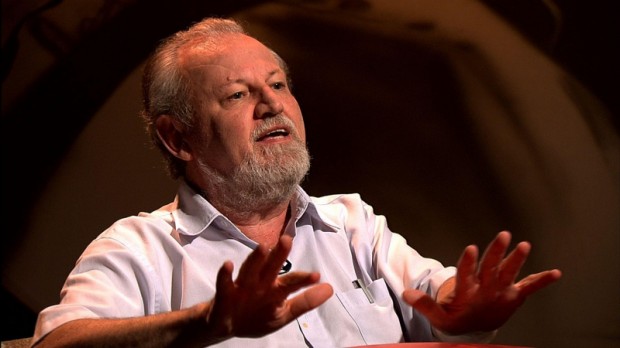On Thursday, July 11, 2013, Brazil erupted in mobilizations, strikes, work stoppages, occupations and road blockades in a National Day of Struggle. Called for by CUT (Central Workers Union), an assortment of labor unions and a vast array of social movements, including the MST, the National Day of Struggle put forth specific demands for the working class and social movements, including a call for agrarian reform. The MST participated and helped lead this mobilization through the country.
of Struggle. Called for by CUT (Central Workers Union), an assortment of labor unions and a vast array of social movements, including the MST, the National Day of Struggle put forth specific demands for the working class and social movements, including a call for agrarian reform. The MST participated and helped lead this mobilization through the country.
The Friends of the MST has translated summaries of the July 11 mobilizations from various sources and presents information on this important struggle. Very few U.S. newspaper carried stories on this phase of the struggle in Brazil.
We are providing these summaries from Brasil do Fato, Folha de São Paulo, Reuters and the Charlotte (NC) Observer.

 The year 2013 won’t be missed by the Landless throughout the country. Regarding the struggle for land, the balance is positive, due to the demonstrations, marches and occupations of land and public buildings that occurred almost throughout the year.
The year 2013 won’t be missed by the Landless throughout the country. Regarding the struggle for land, the balance is positive, due to the demonstrations, marches and occupations of land and public buildings that occurred almost throughout the year. by Joao Pedro Stedile, National Coordination of the MST
by Joao Pedro Stedile, National Coordination of the MST of Struggle. Called for by CUT (Central Workers Union), an assortment of labor unions and a vast array of social movements, including the MST, the National Day of Struggle put forth specific demands for the working class and social movements, including a call for agrarian reform. The MST participated and helped lead this mobilization through the country.
of Struggle. Called for by CUT (Central Workers Union), an assortment of labor unions and a vast array of social movements, including the MST, the National Day of Struggle put forth specific demands for the working class and social movements, including a call for agrarian reform. The MST participated and helped lead this mobilization through the country. In an exclusive interview with the Portal IG, Gilmar Mauro, leader of the Landless Workers Movement, stated that the movement -- which has a constituency estimated to be around two million rural workers -- is building an alliance with urban sectors to take part in protests and put pressure on the Dilma administration to take concrete measures to confront social problems.
In an exclusive interview with the Portal IG, Gilmar Mauro, leader of the Landless Workers Movement, stated that the movement -- which has a constituency estimated to be around two million rural workers -- is building an alliance with urban sectors to take part in protests and put pressure on the Dilma administration to take concrete measures to confront social problems. The MST will be included in the mobilization of trade unions, social movements and political organizations of the working class to take to the streets of the country, on Thursday (July 11), to defend a political platform, with the reduction of working hours, investment of 10% of GDP for health and education, free and quality public transport, the democratization of the media and the implementation of land reform.
The MST will be included in the mobilization of trade unions, social movements and political organizations of the working class to take to the streets of the country, on Thursday (July 11), to defend a political platform, with the reduction of working hours, investment of 10% of GDP for health and education, free and quality public transport, the democratization of the media and the implementation of land reform. On Friday July 5, rural organizations and social movements met with President Dilma Rousseff in the Planalto Palace in Brasilia. They demanded more flexibility and less bureaucracy in carrying out policies in the countryside. “It is necessary and urgent for the government to get rid of bureaucracy.
On Friday July 5, rural organizations and social movements met with President Dilma Rousseff in the Planalto Palace in Brasilia. They demanded more flexibility and less bureaucracy in carrying out policies in the countryside. “It is necessary and urgent for the government to get rid of bureaucracy.